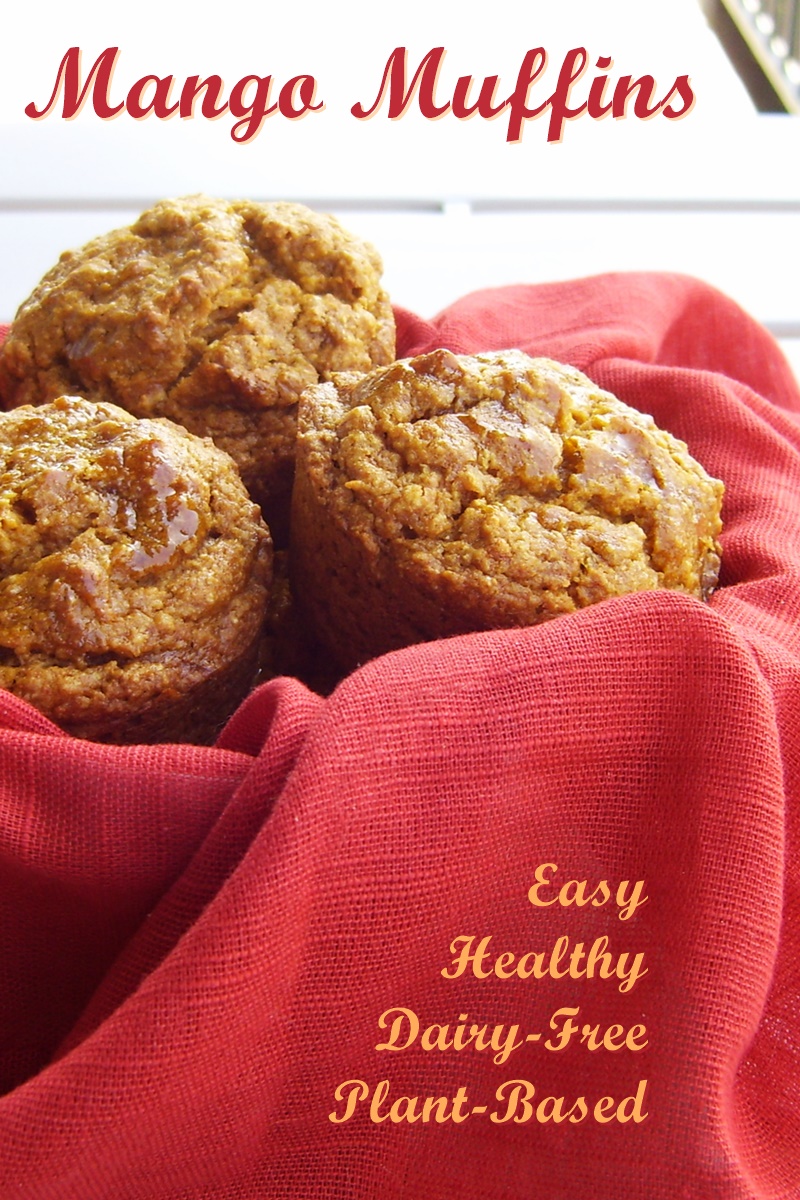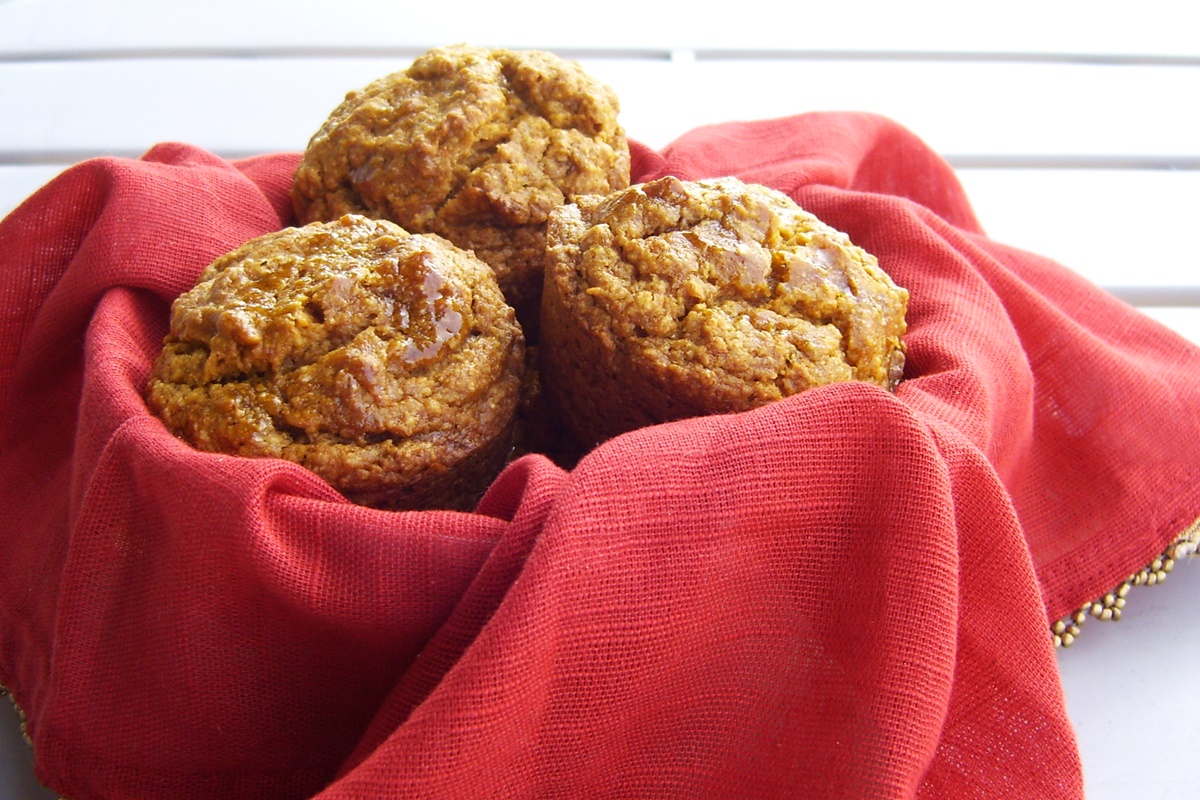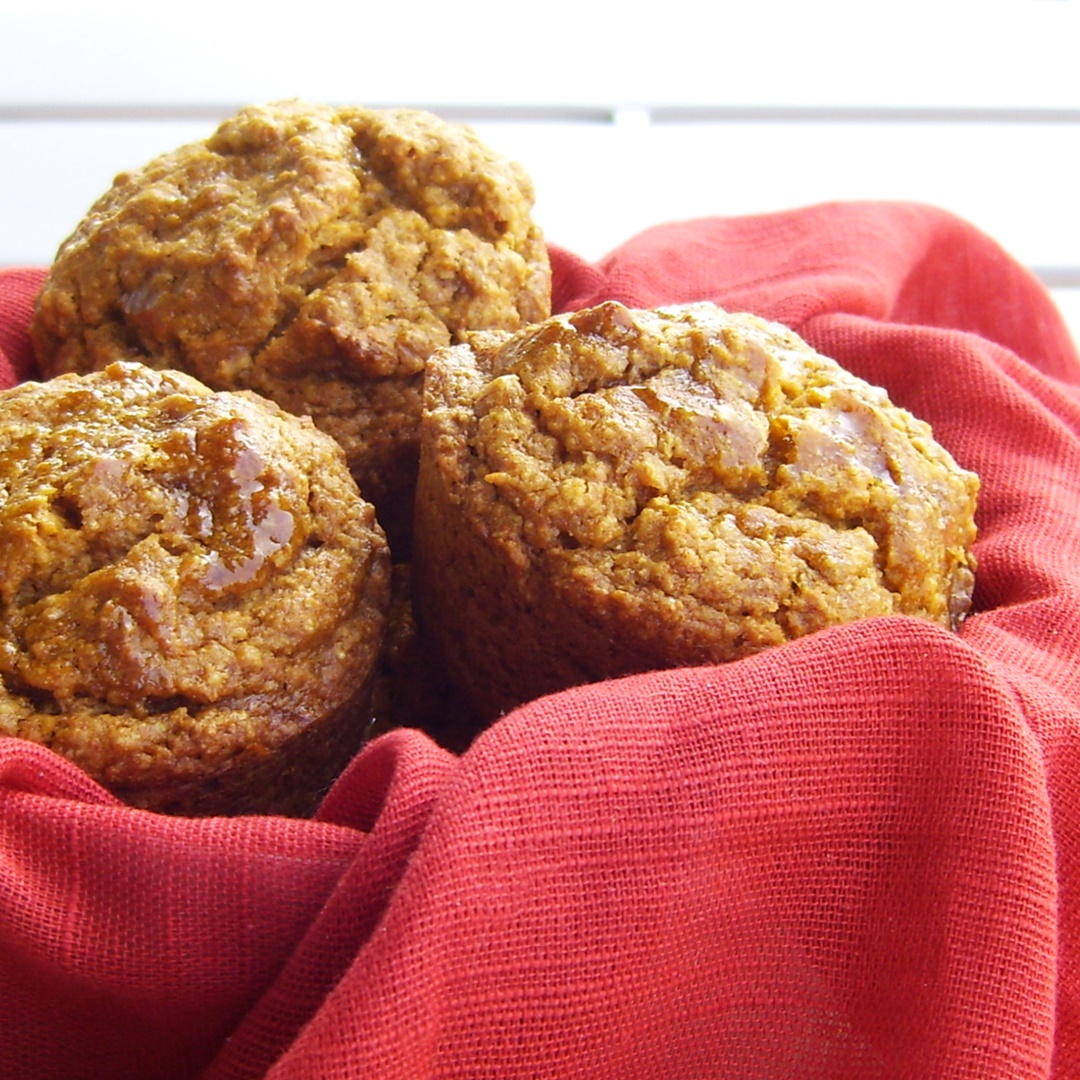Forget those tired banana muffins; jazz up your spring brunch table with some mango! Mangoes begin populating grocery stores in March, in preparation for those juicy summer and fall months. Since we aren’t into the full blown heat of summer yet, I cranked up the oven and made these wholesome and tasty mango muffins.

For some reason, I had the craving to pair mango with honey and vanilla, but you can of course use agave nectar (or honey-flavored agave!) if you prefer a strictly vegan baked goodie. While I’m at it, I have some additional muffin notes for you. I had fun testing this recipe a variety of ways, and, based on experience, I even have some other notes and suggestions below.
Reader Raves
Ann shared her feedback on Facebook after making my mango muffins recipe: “I’ve just made these and they are yummy.” She also asked about storing the muffins. They should keep at room temperature in an airtight container for 1 to 2 days. Store them in the refrigerator for up to 3 day, or individually wrap and freeze the muffins for up to 3 months.

Special Diet Notes: Mango Muffins
By ingredients, this recipe is dairy-free / non-dairy, egg-free, nut-free, peanut-free, soy-free, optionally vegan, and vegetarian.
On Eggs: All of my testers (aka wonderful neighbors) liked this egg-free version of my mango muffins. Nonetheless, I have received emails from people who just don’t like muffins without eggs. If you prefer to use eggs when baking, simply add 1 or 2 beaten eggs to this recipe with the wet ingredients. No other adjustments are required. The eggs offer lift, moisture, and firmness all in one package, so you don’t need to adjust the flour or liquids. Since you will be adding volume, the mango muffins will come out bigger or the batch will make a couple extra.
On Gluten-Free: I haven’t tried these mango muffins gluten-free as of yet, but if you were to experiment, I would add the 1 to 2 eggs mentioned above, and my first trial would probably be with oat flour (ground oats), or with 1-1/4 cups brown rice or white rice flour, 1/2 cup potato starch, and 1/4 cup tapioca starch/flour. You could also trial your favorite gluten-free flour mix / blend. With eggs, it may be okay without any added gums. That all said, here’s the muffin recipe how we liked it.
- 2 cups whole wheat pastry flour (or all-purpose flour, or half all-purpose flour / half regular whole wheat flour)
- 1 teaspoon baking soda
- ½ teaspoon salt
- ¼ teaspoon ground cinnamon, nutmeg, or cardamom, optional
- 1½ cups very ripe mango puree*
- ½ cup honey, plus 1 tablespoon for drizzling (use agave or BeeFree for vegan)
- ¼ cup grapeseed oil, melted coconut oil, or your favorite neutral-tasting baking oil
- 1½ teaspoons vanilla extract
- ½ cup diced mango (I diced it small, about the size of raisins)
- Preheat your oven to 350ºF.
- Prepare 12 muffin cups (I use silicone, and they work best without greasing)
- Combine the flour, baking soda, salt, and spice (if using) in a medium-sized bowl.
- Blend the mango puree, honey, oil, and vanilla in a large bowl (if using the “milk” or egg options below, then add them now).
- Fold the dry ingredients to the wet, along with the diced mango, and stir with a spoon just until combined.
- Some lumps are okay. You don’t want to overmix or the muffins will be dense.
- Bake the muffins for 25 to 30 minutes, or until they begin to brown slightly, pull away from the sides, and a toothpick inserted in a muffin comes out clean.
- Drizzle the muffin tops with the tablespoon of honey.
- Let the muffins cool for 15 minutes in the cups
- Remove the muffins to a wire rack to cool completely.
Variations:
Extra-Moist: Add ¼ Cup Unsweetened, Plain, or Vanilla Milk Alternative (your favorite type) with the wet ingredients. I prefer without (they rise and hold shape better), but two of my tasters liked the “extra moist” batch best.
Vegan: Sub regular Agave Nectar or Honey-flavored Agave Nectar for the Honey.
Other Fruit: Feel free to sub the mango puree with papaya puree or even banana puree. With banana, I’d probably up the cinnamon.
Tropical Flair: Use coconut oil for the oil, and add ½ cup unsweetened or sweetened shredded coconut. You could also toss in some chopped macadamias if desired.
This recipe is Vegan, Reduced fat, Whole Grain, Refined Sugar-Free, Dairy-Free, Egg-Free, Nut-Free, Peanut-Free.


14 Comments
How much date syrup can I use instead of honey?? We are a honey free home.
I haven’t baked with date syrup. My best guess would be to use a 1:1 ratio. It will affect the flavor though.
I used a local honey and tried the cardamom. Delicious! Came out perfect.
Glad the recipe worked so well for you Kristi!
Followed the recipe exactly and they turned out perfect! Thank you!
Yeah – a winner – thank you!!!!
Glad you enjoyed Mary!
My muffins didn’t rise at all, and they’re very wet. Could I have some tips on what could’ve gone wrong? I used frozen mango and used sugar free maple syrup instead of honey.
Hi Ann, my first inkling would be to say that it was the sugar-free sweetener. Sugar-free sweetener alternatives tend to behave very differently in baked goods. Sugar has a structural role in baking, beyond just adding sweetness. Other possible issues could have been too much moisture from using frozen mango or the leavener. I’m assuming you didn’t substitute baking powder for the baking soda – baking soda is much more powerful. It would be rare for baking soda to go bad, but it can lose some potency if well past expiry. These are denser, like banana muffins, since they use pureed fruit. BUT they shouldn’t be wet, and they should set up and rise like the ones shown. I’m so sorry yours isn’t working out with the alternative sweetener!
Oh my gosh, I need to make these with my mango-obsessed kid!
Yes, yes you do! 🙂
You were spot on with these muffins! I’ve been on a mango kick lately so it was such a great way to use slightly overripe mangoes. Makes exactly 12 regular muffins and I love the addition of sweet clover honey on top! Love your recipes and I love your book! Thanks for all you do for the dairy free community! You have helped me feel like I don’t have to deprive myself of sweets, and I can do so without a guilty conscience!
Melody, you are too sweet! I’m so glad you enjoyed the muffins and have been liking my recipes – more to come!
Pingback: Mangos Mangos, Everywhere | Agrincala